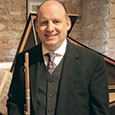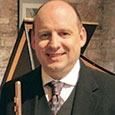He played the piece spot on, as my British friends would say: perfect notes and counting, great effort and dynamics, every note clear as a bell, and every articulation nice and clear. I asked if he felt he knew the piece now, and he answered in the affirmative. I kindly reminded him that while he did a great job preparing the piece, he now was ready to tell a tale with it and incorporate his life experience into the interpretation. He looked a bit forlorn as I pointed this out. Just because a musician has technically and musically mastered a piece, it does not mean that it will move an audience.
“How will you change the lives of the listeners when you play this for them? What has happened to you that you can play for them with no words or text to explain what is going on? Do you think that because this piece happens to have a lot of notes, it is automatically interesting and entertaining? Are you planning to play exactly as you did during the previous piece or are you a new character in the play or movie?” As I asked him these questions, I was met with a slightly befuddled blank stare, and he seemed a bit hurt, which I understood since the same thing had happened to me as a young student.
When I first played the Poulenc Sonata for flute and piano many years ago, it meant different things to me than it does now. Hopefully, I have a greater command over the technical aspects than before, but, most importantly, I have evolved with it, or perhaps I should say that it has evolved with me and been my good friend all these years.
The opening of the Poulenc is something I remember being discussed in classes on a regular basis. This opening phrase should be played in such a way that it sounds smooth and effortless. Some wonderful teachers gave me the tools to learn to control such a phrase, but it turned out to be my life experiences more than anything that helped me tell a story with these notes. I do not mean to say that the words of a great master fell on deaf ears, not by a long shot, but having an audience feel and experience a piece of music is vastly different than having them merely hear it.
I remember when Rampal would come to my town to play and give the occasional masterclass. We would sit in anticipation of some magical technical advice or musical potion from Le Maitre de la flute. He would often mention a few ways he practiced or worked on things, but the rest of his advice was pure artistic gold. He talked about character and mood and intensity. I walked away inspired but not wondering about the technical advice so much.
Consider, for example, the beautiful Siciliano movement from the J.S. Bach Eb Major Sonata. One of my biggest concerns when first playing this was accurate notes and rhythm, which I was able to grasp without too much trouble. Then came the breathing. I always wondered how Baroque flute players managed to play such long phrases on the instruments of the era. The mistake I commonly made was to think in terms of slow and fast for this type of music. A good teacher and some basic research made me realize that these Bach movements are really more akin to dances. When I did not play this movement too slowly, the phrasing and breathing got better.
Every time I played this movement at school, I felt the comfort of my childhood. It made me remember my first student recitals and my favorite teacher. I learned early on that the easiest way to interpret any music is to simply play as if you are recalling good memories. If we can do that, surely the audience will feel what we are playing as opposed to simply hearing it.
As I have gone through life, this Bach Siciliano has become an old friend that always knows just what to say in a crisis. No matter what I go through, the simple beauty of the music reminds me of why I became a musician.
I played the Bach on a concert not long after my son was born. Someone from the audience came up to me afterwards and said that my playing of the Siciliano reminded him of a lullaby. It was true that as I played I was picturing myself holding a newborn without trying to wake him. That experience was about 25 years after I first encountered the work. It was no longer just a piece that I played; it had become a vehicle of expression about what was happening in my life.
Most students have limited life experiences. Teachers can help them recall an earlier experience such as singing lullabies to younger siblings. As an alternative, a scene in a movie or television show may call up useful memories and images.
The question still remains: When do you really know a piece? It might be that moment when audience members seem to hold their breath as you play a long phrase or when you see them smiling back at you at the end of the piece. Perhaps after a concert you might hear that it felt as if you were playing directly to each person in the audience. If and when that happens, walk away proud. Comments like these mean that you have truly expressed yourself.






